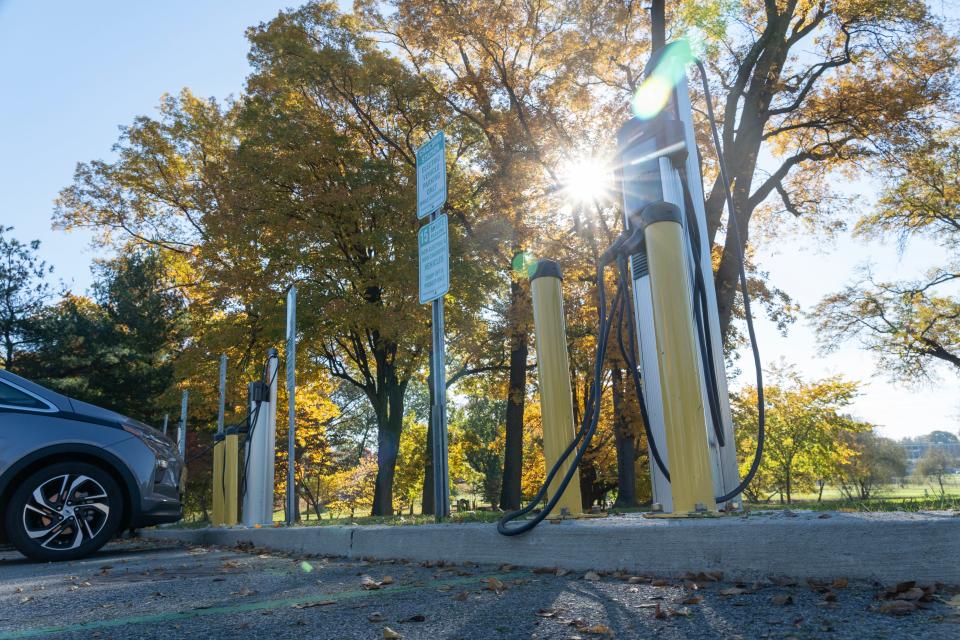This is why New Jersey businesses stand behind Phil Murphy’s electric vehicle policy
The tri-state area that includes New Jersey, New York and Pennsylvania — with an annual GDP totaling over $2.7 trillion in goods and services — is one of the most densely populated, economically productive and traffic-congested regions in the country. In fact, New Jersey has more highway per square mile than any other state, so wherever you live or work, you’re probably not very far from the smog-choked shoulder of a major traffic corridor.
New Jersey is long overdue for an air quality cleanup. Our company, Hugo Neu, is the long-standing owner of Kearny Point, a consistent equitable economic anchor and employment generator for Hudson County — the most densely populated county in the nation. We can attest to the crucial benefits that the Murphy administration’s proposed Advanced Clean Cars II — or ACCII — policy will provide, and the importance of positioning our state as a national leader in the green economy. As such, we are transitioning Kearny Point to support and enable greater EV capacity.

The economically disastrous consequences of our state’s tailpipe pollution crisis have gone unchecked for far too long. According to the American Lung Association, implementing zero-emissions transportation and electricity resources in New Jersey would prevent 464,000 lost workdays and save $43.6 billion in avoided health care costs before 2050. These two precious resources — time and money — are the fuel that local businesses run on. In order to stay nationally and globally competitive into the future, New Jersey’s business community is counting on policymakers to approve the strongest possible air quality standards.
In the business world, it’s no secret that the future of transportation is electric. At least 10 automakers will be totally phasing out gas cars over the coming years. Some of the world’s leading brands — including GM, Volvo, Volkswagen and Mercedes — will be selling only zero-emissions vehicles by 2030 or 2035. ACCII provides a crucial opportunity for New Jersey to meet the market where it’s headed — that’s why eight states have already adopted the standard, with seven more, and D.C., currently moving through the rulemaking process.
Switching to electric vehicles isn’t just a public health and sustainability issue; it’s a cost issue as well. A model year 2023 electric car costs about the same as an equivalent gas car — but that’s before a federal tax credit of up to $7,500, plus New Jersey’s sales tax exemption for zero-emissions vehicles. The savings don’t stop at the dealership: Driving an electric car or SUV saves money on operating and maintenance costs so long as the price of gasoline remains above $0.50 per gallon. For businesses whose operations involve transportation or delivery fleets, saving money on the lifetime of each vehicle can quickly add up.
EVs require dedicated charging infrastructure, but local businesses will not bear the brunt of these costs, as funding is being provided through the Bipartisan Infrastructure Law. The New Jersey state government provides a wide array of additional incentives, grants and rebates for businesses to purchase EVs and charging stations.
Ørsted is out. What now?: New Jersey has to hit the reset button on its energy policy — and get it right
Delaying or obstructing ACCII would be hugely shortsighted, as the climate crisis continues to pump untenable risks into the local and national economies. This year, New Jersey got a small taste of the severe wildfires and floods that are making huge swaths of America completely uninsurable. Transportation is the single largest source of greenhouse gas emissions in the United States — and pollution from light-duty vehicles is the main culprit.
ACCII would be a win-win for New Jersey — benefiting our residents, overburdened communities and environment, while also driving economic growth, creating jobs and supporting the business community.
Dominique Lueckenhoff is senior vice president for corporate affairs, environmental health, safety and sustainability for the Hugo Neu Corporation and Hugo Neu Kearny Point development in Kearny.
This article originally appeared on NorthJersey.com: Phil Murphy electric vehichle policy: Why NJ businesses should support

